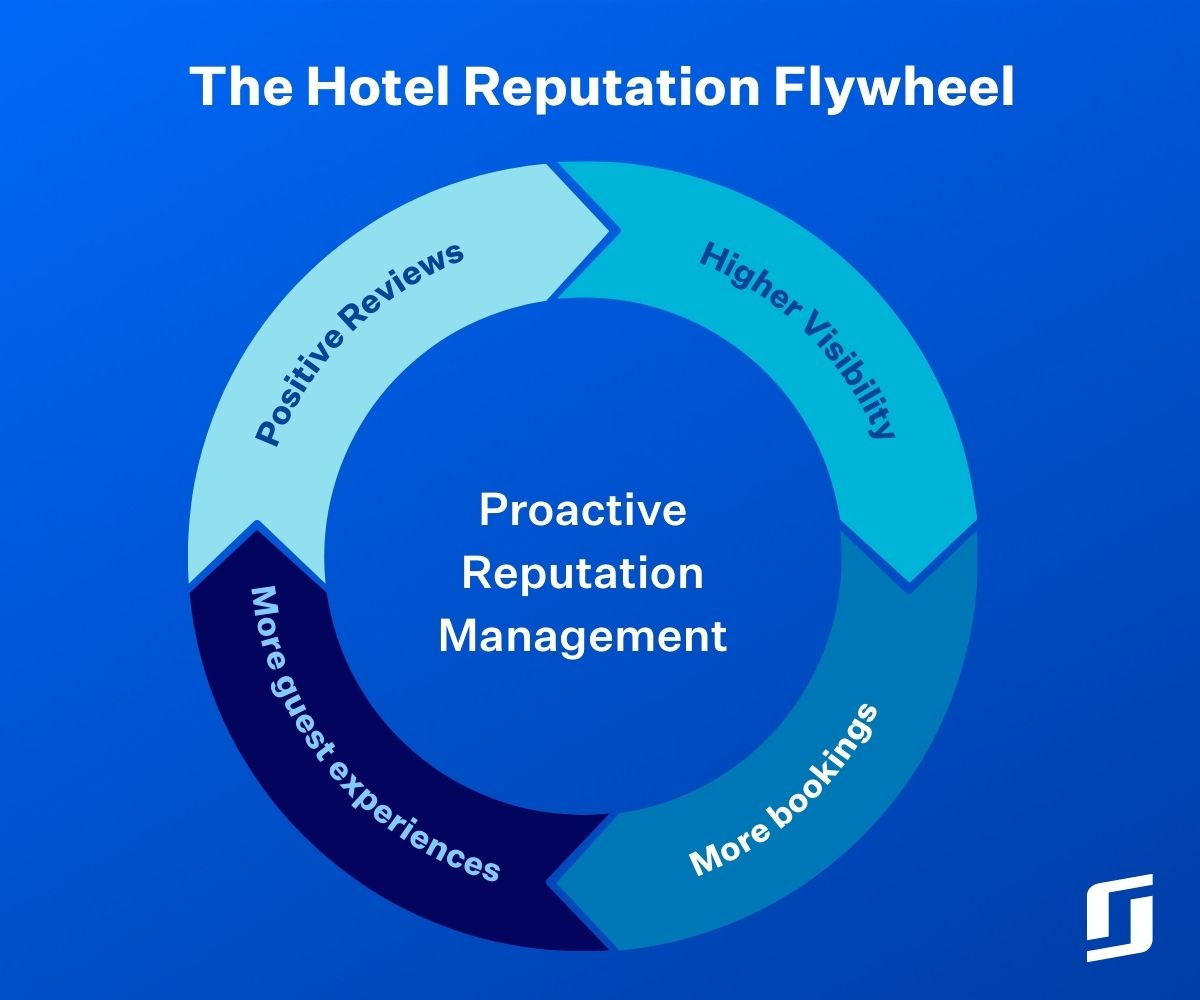What is hotel reputation management?
Hotel reputation management is the process of monitoring and influencing how your property is perceived, both online (online travel agencies, review platforms, social media) and in the real world. The aim is to amplify positive guest experiences and identify/resolve issues quickly. This hotel management strategy protects revenue, strengthens brand loyalty and improves occupancy.
For hotel groups and chains, reputation management isn’t just about responding to the occasional negative review; it’s a strategic, multi-site discipline that impacts pricing power, OTA visibility, and the ability to attract direct bookings.
Modern guests do extensive research online. Where they once compared hotels based on amenities, brand name and the old star system, they now focus on reviews and ratings. It’s therefore essential that your online presence reflects the quality of your on-site experience, and vice versa.
Strong reputation management includes encouraging satisfied guests to leave reviews and improving your operations based on analysis of guest sentiment. By proactively managing your digital reputation, your hotel can increase bookings, room rates and revenue.
This guide will show you how to better manage your hotel’s reputation across multiple properties.
Table of contents
Why should hotel online reputation management be a top priority?
Hotel online reputation management directly influences guest decision-making and a hotel’s ability to generate revenue. Reviews are often the key factor in a traveller’s decision to book, and even a slight slip in rating can have a measurable financial impact. Ignoring your online reputation isn’t a passive decision – it will actively result in lost bookings and revenue if it goes unmanaged.
Your hotel’s online reputation can be thought of as your digital storefront – a guest’s first (and lasting) impression of your hotel. According to recent industry research, 70.9% of travellers say a hotel’s online reputation influences where they choose to stay, and 81% always or frequently read reviews before booking. It’s not enough to simply avoid negative reviews: 49% of travellers say they won’t book a hotel with zero reviews, so even silence can deter potential guests from staying with you.
The revenue impact of rating changes is well documented: studies show that a single star decrease in a hotel’s rating can trigger a 5-9% drop in revenue.
With travellers now easily able to compare properties side by side online, ratings and reviews shape perceived value as much as traditional differentiators like amenities, location or price point. In a market where guest perception is public, dynamic and highly influential, reputation must be a strategic priority for hotel management.
Key takeaways
- Online reputation directly affects guest booking decisions and significantly impacts revenue performance.
- A one-star drop in your rating can cause revenue to dip by up to 9%.
- Strong, consistent reviews build perceived value and attract more bookings than amenities or location.
Turn your reputation into revenue with SiteMinder
Transform guest feedback into bookings. Monitor reviews across all platforms, respond faster with integrated tools, and connect reputation insights directly to your booking performance.
Learn about our platform
What are the key benefits of hotel reputation management?
Hotel reputation management can deliver measurable gains in guest trust, bookings and revenue. By actively shaping how your property is perceived online, you increase visibility, build credibility and convert more prospects into customers. Active management both protects your brand and powers commercial performance.
Reputation management directly impacts booking conversions. Hotels with higher ratings appear more prominently on OTAs, metasearch engines and Google, and are more likely to earn clicks and reservations. A strong online reputation builds trust before guests even arrive, giving them confidence that your hotel will deliver the quality experience—which can often justify higher rates.
Beyond revenue, you can gain valuable insight into guest preferences. Analysing and responding to reviews helps you spot issues and trends early, improving guest satisfaction.
Proactive hotel online reputation management can create a virtuous cycle, where positive reviews drive bookings, which in turn generate more positive reviews.

Key takeaways
- A strong online reputation increases visibility, trust and bookings.
- Higher ratings can improve your online rankings and justify premium pricing.
- Proactive review management delivers insights that enhance guest satisfaction and loyalty.
What are the key strategies for effective hotel online reputation management?
Proactive hotel reputation management is critical:
- 63% of travellers say they’re more likely to book a hotel if the owner responds to the majority of reviews, 77% say personalised responses increase their likelihood to book.
- Studies show negative reviews can have a significant impact: for specific hotel profiles, negative reviews can deter up to 22% of new customers.
- But proactivity helps here too: according to Yelp, 33% of users are more likely to upgrade their negative review if a business responds with a personalised message within 24 hours.
Let’s explore the strategies that can help you to better manage your property or hotel chain’s reputation.
Monitor reviews and social media channels
Actively tracking guest feedback across booking channels, metasearch, and social media reveals how your hotel is perceived, and how those perceptions are changing. This visibility enables you to identify patterns, spot emerging issues before they escalate, and take informed, proactive action to protect your brand’s reputation.
Address negative feedback
Negative reviews can damage your reputation, but a swift, empathetic and solution-focused response can turn a poor experience into an opportunity to show the quality and values of your hotel business. By resolving concerns promptly and publicly, you limit the impact on your reputation and demonstrate to future guests that issues are taken seriously. In some cases, a thoughtful response can mitigate reputation damage and even build trust that leads to bookings.
Respond to all reviews
While addressing negative reviews is critical, responding to all reviews—positive and negative shows professionalism, care and accountability. Travellers are more likely to book when they see management actively engaging with feedback, as it signals that guests are listened to and their experiences genuinely matter.
Engage with your audience
Actively engaging with guests through reviews, social media, and post-stay follow-ups can create deeper connections, potentially resulting in guest loyalty. This creates more of the social proof that modern travellers base their booking decisions on.
Improve guest service and staff
Guest feedback reveals patterns that operational data often misses. When multiple reviews mention slow check-in times, inconsistent room cleanliness, or unresponsive front desk staff, you’re seeing systemic issues that affect your reputation and revenue.
Identify recurring themes in guest feedback, then invest in targeted staff training, process refinements and service improvements that address root causes. For multi-property operators, this means establishing standardised service protocols whilst allowing individual properties to address location-specific concerns.
Key takeaways
- Monitor and respond to reviews proactively to protect your reputation and influence bookings.
- Address negative feedback quickly and empathetically to turn issues into opportunities.
- Identify recurring themes in guest feedback, then invest in targeted staff training and process refinements that address root causes.
- Use guest insights to improve service, encourage loyalty and strengthen your reputation.
What is the best hotel reputation management tool?
The best hotel reputation management tool consolidates reviews from multiple platforms into a single dashboard, enabling you to monitor sentiment, respond quickly, and identify trends across your properties. For multi-property operators, the right tool should also benchmark performance across locations and streamline response workflows so your team can maintain consistency at scale.
SiteMinder provides this foundation through integrations with reputation management platforms like ReviewFilter for centralized review management, GuestRevu for automated post-stay review requests to drive more positive feedback, and TripAdvisor Reputation Pro for competitive intelligence and response management.
But reputation management isn’t isolated from other operations. SiteMinder’s platform connects reputation insights to your broader hotel technology stack, including the world’s #1 channel manager, giving you visibility into how reputation impacts bookings, channel performance, and revenue. For hotel groups, this integration means you can track how reputation improvements translate to commercial outcomes across every property.
Through SiteMinder’s extensive partner ecosystem, you can also access guest experience apps that enhance every touchpoint of the guest journey and integrate with revenue management systems that ensure reputation gains drive measurable profit growth.
Integrate to SiteMinder’s vast ecosystem
Connect to SiteMinder’s extensive network of technology systems and partners to maximise your efficiency, bookings, and revenue.
Learn More
FAQs on hotel reputation management
What is reputation management in hospitality?
Reputation management in the hospitality industry involves actively monitoring and shaping how guests perceive your hotel, particularly online. This includes tracking reviews across booking sites and social media, responding to feedback professionally, and implementing service improvements based on guest sentiment. Effective reputation management protects revenue, builds guest trust, and strengthens your brand positioning against competitors.
What is the best hotel reputation management software?
The best reputation management tools centralise reviews from multiple platforms, provide real-time alerts for new feedback, and enable efficient response workflows. For multi-property operators, look for tools that offer cross-property benchmarking and standardised response templates. SiteMinder integrates with leading reputation management platforms and connects reputation data to booking performance, giving you a complete view of how guest perception affects revenue.
What is an example of reputation management?
A hotel notices recurring complaints about slow check-in across reviews on multiple platforms. The operator responds to each review acknowledging the issue and explaining improvements being made. Simultaneously, they implement a mobile check-in option and add front desk staff during peak hours. Within three months, check-in complaints decrease by 75%, average rating improves by 0.3 stars, and conversion rates on OTAs increase as prospective guests see both the responsiveness and the resolution.
How can I improve my hotel reputation?
Improve your hotel’s reputation through consistent monitoring, timely responses, and operational improvements. Track reviews across all major platforms, respond to every review (positive and negative) within 24-48 hours, and analyse feedback for recurring themes. Use guest insights to train staff, refine processes, and address service gaps. Encourage satisfied guests to leave reviews through post-stay emails. For hotel chains, establish standardised response protocols and service standards across properties whilst allowing local teams to address property-specific concerns.


